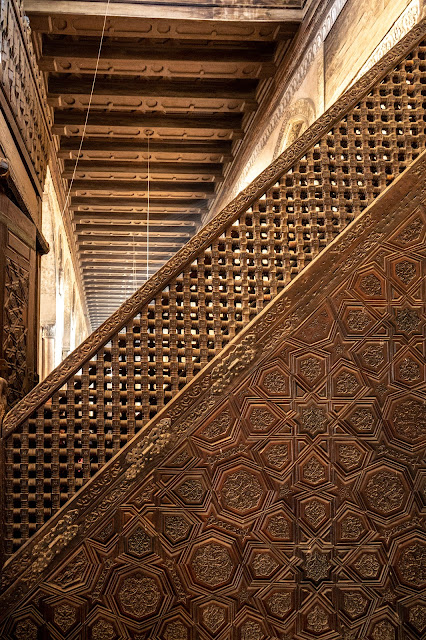In January 2023 I traveled to Egypt as part of a small group tour conducted by Road Scholar. I decided to post some of the photo highlights from that trip.
Yes, I did take a camel ride on the day that we visited the Pyramids of Giza--and did not fall off.
We had ample time to walk around the pyramids as well as the Great Sphinx of Giza.
Later that day we visited the Egyptian Museum. This is the older venue; the new Grand Egyptian Museum was not yet open, but most of the exhibits were still housed at the older site.
This latter is an alabaster conoptic jar that holds one of King Tut's mummified organs.
We also spent time exploring the market areas in downtown Cairo, in some ways a chaotic urban area in one of the largest cities in the world. The first photo is of finials that are used to top mosque minarets, the tall, slender towers that are used to call the faithful to daily prayers. If the minaret was completed at the time of a full moon, the finial is one topped with a circle. If the ninaret is completed during a different period in the lunar cycle, the the finial used is crescent-shaped.
A handsome guy who was happy to have his picture taken.
One of the tombs we visited was at Saqqara, south of Cairo. This was a tomb, not of royalty but of a senior official of one of the dynasties from approximately 2,300 BCE. The bas relief sculptures lining the walls of several rooms in the tomb were exquisite.
The following is from a venue in the Alexandria area that we also visited. I just happen to like the shot for its composition.
We also visited Bishoy Monastery, a fourth century Coptic Christian monastery between Cairo and Alexandria. Note the three-dimensional cross.
During the latter part of the tour, we traveled to southern Egypt to visit temples and tombs of some of the pharaohs. Our lodging during this part of the tour was a cruise ship on the Nile. One evening we just happened to catch a sunset on the river on the top deck of the ship.
During much of our time in southern Egypt we explored both tombs and temples from the various dynastic periods, extending from around 1,500 BCE to the end of the pharaonic period, second century BCE, when the Greek influence became more prominent. Here are some photos from those visits.
Temple scenes:
Photos from the tombs of King Tut and Ramses III:
One of the most impressive venues that we visited was Abu Simbel, consisting of temples created by Ramses III and his wife, Nefertari. This was in the 13th century BCE. Unfortunately, when the Aswan High Dam was planned, the rising waters of the Nile to the south of the dam would create a lake, Lake Nasser, which would place the entire site under water. So the site was painstakingly and carefully dismantled, piece by piece, and then rebuilt on higher ground to preserve the archaeology for research and for the public to enjoy. It was truly impressive.
John























